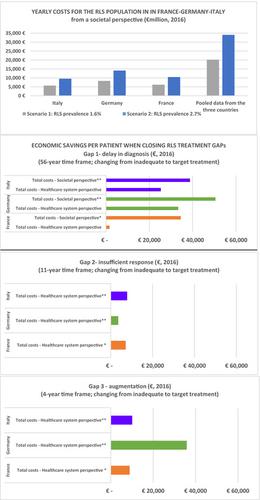当前位置:
X-MOL 学术
›
Eur. J. Neurol.
›
论文详情
Our official English website, www.x-mol.net, welcomes your
feedback! (Note: you will need to create a separate account there.)
Socioeconomic impact of restless legs syndrome and inadequate restless legs syndrome management across European settings
European Journal of Neurology ( IF 4.5 ) Pub Date : 2020-10-12 , DOI: 10.1111/ene.14582 C Trenkwalder 1, 2 , M Tinelli 3 , G K Sakkas 4, 5 , Y Dauvilliers 6 , R Ferri 7 , R Rijsman 8 , W Oertel 9, 10, 11 , J Jaarsma 10, 12, 13
European Journal of Neurology ( IF 4.5 ) Pub Date : 2020-10-12 , DOI: 10.1111/ene.14582 C Trenkwalder 1, 2 , M Tinelli 3 , G K Sakkas 4, 5 , Y Dauvilliers 6 , R Ferri 7 , R Rijsman 8 , W Oertel 9, 10, 11 , J Jaarsma 10, 12, 13
Affiliation

|
Restless legs syndrome (RLS) is one of the most common neurological disorders. It describes an irresistible urge to move the legs, mostly manifested in the evening and at night, which can lead to severe sleep disturbance. As part of the European Brain Council (EBC)‐led Value‐of‐Treatment project, this study aimed at capturing the socioeconomic impact of RLS related to the inadequate diagnosis and treatment across different European healthcare settings. The economic burden of RLS was estimated using the published EBC framework of analysis in three separate European Union healthcare systems (France, Germany, and Italy). The RLS care pathway was mapped to identify the unmet needs of patients. Based on specific patient stories, the economic impact of correctly diagnosing RLS and changing between inadequate and target treatment was calculated using appropriate scenario analysis. RLS proved to be a significant personal and social burden, when epidemiological data, high prevalence of RLS, and its need for treatment are combined. By looking at the savings emerging from the provision of optimal care management (timely and correct diagnosis, evidence‐based therapy, avoidance of therapy‐related complications such as augmentation), the authors foresee substantial economic savings with the achievement of adequate diagnosis and treatment of RLS. Education about RLS is urgently needed for all subspecialties involved in RLS patient care as well as the general public. Equally important, the search for new causal treatment strategies should be intensified to reduce suffering and substantial societal cost.
中文翻译:

不安腿综合征和不安腿综合征管理不善在欧洲各地的社会经济影响
不宁腿综合征 (RLS) 是最常见的神经系统疾病之一。它描述了一种不可抗拒的移动腿的冲动,主要表现在傍晚和夜间,这会导致严重的睡眠障碍。作为欧洲脑理事会 (EBC) 主导的治疗价值项目的一部分,本研究旨在捕捉与欧洲不同医疗保健环境中诊断和治疗不足相关的 RLS 的社会经济影响。RLS 的经济负担是在三个独立的欧盟医疗保健系统(法国、德国和意大利)中使用已发布的 EBC 分析框架估计的。映射 RLS 护理路径以识别患者未满足的需求。根据具体的患者故事,使用适当的情景分析计算正确诊断 RLS 以及在不适当和目标治疗之间改变的经济影响。RLS 被证明是一个重大的个人和社会负担,当流行病学数据、RLS 的高患病率及其治疗需求相结合时。通过查看提供最佳护理管理(及时和正确的诊断、循证治疗、避免与治疗相关的并发症(如增强))所带来的节省,作者预见到实现充分的诊断和治疗可节省大量的经济成本。 RLS。参与 RLS 患者护理的所有亚专业以及公众都迫切需要有关 RLS 的教育。同样重要的是,
更新日期:2020-10-12
中文翻译:

不安腿综合征和不安腿综合征管理不善在欧洲各地的社会经济影响
不宁腿综合征 (RLS) 是最常见的神经系统疾病之一。它描述了一种不可抗拒的移动腿的冲动,主要表现在傍晚和夜间,这会导致严重的睡眠障碍。作为欧洲脑理事会 (EBC) 主导的治疗价值项目的一部分,本研究旨在捕捉与欧洲不同医疗保健环境中诊断和治疗不足相关的 RLS 的社会经济影响。RLS 的经济负担是在三个独立的欧盟医疗保健系统(法国、德国和意大利)中使用已发布的 EBC 分析框架估计的。映射 RLS 护理路径以识别患者未满足的需求。根据具体的患者故事,使用适当的情景分析计算正确诊断 RLS 以及在不适当和目标治疗之间改变的经济影响。RLS 被证明是一个重大的个人和社会负担,当流行病学数据、RLS 的高患病率及其治疗需求相结合时。通过查看提供最佳护理管理(及时和正确的诊断、循证治疗、避免与治疗相关的并发症(如增强))所带来的节省,作者预见到实现充分的诊断和治疗可节省大量的经济成本。 RLS。参与 RLS 患者护理的所有亚专业以及公众都迫切需要有关 RLS 的教育。同样重要的是,











































 京公网安备 11010802027423号
京公网安备 11010802027423号